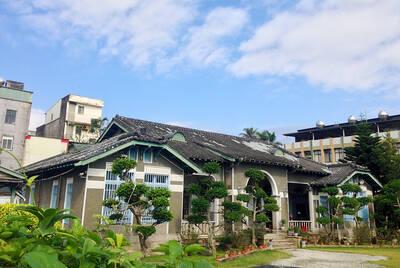When Singapore’s Yung Raja remixed Gucci Gang by US rapper Lil Pump, he swapped the original’s flashy cars and a prowling tiger for a beer can and Tamil food in a viral YouTube video that reeled in hip-hop label Def Jam.
His 2018 version — Poori Gang — was a trial run for the “concoction of Tamil and English” the 24-year-old says defines his flow.
The overnight success, even among non-Tamil speakers in ethnically diverse Singapore, proved to Yung Raja that he could embrace his own identity without copying other Western artists he admired.

Photo: AFP
He is among a growing number of artists from Singapore, Indonesia, Malaysia, Thailand and the Philippines snapped up by the label behind superstars from LL Cool J to Jay-Z and Rihanna.
Def Jam is hoping to capitalize on a new wave of regional rap stars from the untapped Southeast Asian market where streaming platforms are flourishing.
“It’s just exploding,” says Yung Raja, who has drawn comparisons to US superstar Kendrick Lamar.

Photo: AFP
Moving from DIY passion projects to big stage shows, regional rappers are now touring beyond their borders, delivering verses in slick videos streamed online.
‘PUT YOUR HANDS UP’
In a secluded patch of forest on Bangkok’s outskirts, Thai-American DaBoyWay is shooting Baby You.
Bonfires and dancers illustrate verses about being cast under a spell for a track from his new album — out this month — that will be Def Jam’s first major Southeast Asian test.
A pioneer of Thailand’s rap scene, DaBoyWay raps in both Thai and English, in a nod to his US background.
Singles on the album vary from the gritty Gangsh!t to the more club-friendly Kaow Ma, which means “Welcome” in Thai.
The 39-year-old — who now has a million Instagram followers — remembers the early struggles of a genre that rubbed against Thailand’s conservative norms, where fans had to be prodded into letting go at concerts.
“They would not move until you tell them it’s okay to move,” he says at a studio in Chonburi province, near the resort town of Pattaya.
Fast forward to 2018 and popular Thai talent show The Rapper racked up tens of millions of views on YouTube in its first season.
That same year a collective of underground artists known as R.A.D. — or Rap Against Dictatorship — released searing verses criticizing the country’s military that drew well over 60 million views on YouTube.
Fan Pornchai Puthinarabul, who attended a recent DaBoyWay show, credits his “idol” for the genre’s growth in Thailand.
“He’s opened a market for us Thais,” Pornchai said before re-joining concert-goers jammed into a popular Bangkok bar. Asia’s dominant music-streaming platforms like Tencent-owned JOOX have been swift to take notice.
In 2020 its user base reached 290 million in Thailand, Myanmar, Malaysia, Indonesia and Hong Kong, according to company data.
Hip-hop became the second most popular genre, after pop, on JOOX in Thailand late last year.
GAMELANS AND TRAFFIC JAMS
The new roster of rap artists weave heritage, local culture, and their roots into their music.
Asked for his influences Singapore’s Yung Raja ticks off a melange spanning continents, from Canadian artist Drake to famed Indian actor Rajinikanth.
Jakarta-born artist A Nayaka, the first Indonesian rapper signed to Def Jam, has rhymed about the Indonesian capital’s gruelling traffic and other local landmarks in a longstanding hip-hop tradition of name-checking neighborhoods, streets, and communities.
“Basically if Jakarta kids heard my lyrics they’re gonna say, ‘oh my god, that’s that,’” he says.
The diversity of Southeast Asia — with dozens of languages, religions, cultures and ethnicities — is its strength, according to Joe Flizzow, a Malaysian considered the godfather of the region’s rap scene and a Def Jam executive.
Whether snatching samples from the traditional gamelan — a brass glockenspiel-like instrument — or with lyrics touching on corruption and oppression, artists are representing their origins in different ways.
“You are not going to see some Bentleys and Rolls Royces,” he says. “You are gonna see some Honda NSXs and GTRs... we want to be unique.”

From the last quarter of 2001, research shows that real housing prices nearly tripled (before a 2012 law to enforce housing price registration, researchers tracked a few large real estate firms to estimate housing price behavior). Incomes have not kept pace, though this has not yet led to defaults. Instead, an increasing chunk of household income goes to mortgage payments. This suggests that even if incomes grow, the mortgage squeeze will still make voters feel like their paychecks won’t stretch to cover expenses. The housing price rises in the last two decades are now driving higher rents. The rental market

July 21 to July 27 If the “Taiwan Independence Association” (TIA) incident had happened four years earlier, it probably wouldn’t have caused much of an uproar. But the arrest of four young suspected independence activists in the early hours of May 9, 1991, sparked outrage, with many denouncing it as a return to the White Terror — a time when anyone could be detained for suspected seditious activity. Not only had martial law been lifted in 1987, just days earlier on May 1, the government had abolished the Temporary Provisions Effective During the Period of National Mobilization for Suppression of the Communist

When life gives you trees, make paper. That was one of the first thoughts to cross my mind as I explored what’s now called Chung Hsing Cultural and Creative Park (中興文化創意園區, CHCCP) in Yilan County’s Wujie Township (五結). Northeast Taiwan boasts an abundance of forest resources. Yilan County is home to both Taipingshan National Forest Recreation Area (太平山國家森林遊樂區) — by far the largest reserve of its kind in the country — and Makauy Ecological Park (馬告生態園區, see “Towering trees and a tranquil lake” in the May 13, 2022 edition of this newspaper). So it was inevitable that industrial-scale paper making would

Hualien lawmaker Fu Kun-chi (傅?萁) is the prime target of the recall campaigns. They want to bring him and everything he represents crashing down. This is an existential test for Fu and a critical symbolic test for the campaigners. It is also a crucial test for both the Chinese Nationalist Party (KMT) and a personal one for party Chairman Eric Chu (朱立倫). Why is Fu such a lightning rod? LOCAL LORD At the dawn of the 2020s, Fu, running as an independent candidate, beat incumbent Democratic Progressive Party (DPP) lawmaker Hsiao Bi-khim (蕭美琴) and a KMT candidate to return to the legislature representing